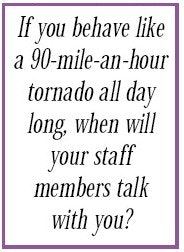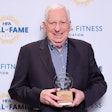Great Managers Set Clear Goals and Help Employees Achieve Them

Lisa had earned her recreation degree and all her certifications. Delighted to work in her chosen field, she was hired to be in charge of the recreation center when her manager wasn't on the premises.
She was a brand-new, educated professional - but it soon became clear Lisa wasn't doing her job well. Put yourself in her manager's shoes: You've compiled a list of all the things Lisa has done wrong. You could use her 90-day review to dump the list on her, but this wouldn't be the most constructive solution for either of you. A better approach, certainly, would be to redirect her actions without dampening her enthusiasm - to act as a coach rather than a hard-nosed, authoritarian boss.
I was the manager facing this dilemma, and found that the coach approach worked well. Over breakfast, Lisa and I had an open conversation about her future success in her job. By following a checklist of skills she needed to develop, spelling out examples of problems that occurred and discussing how she could solve them proactively, we came to a better understanding. For example, it was important for Lisa to improve her ability to meet patrons' needs. In action, this meant that two weeks before a tae kwon do tournament, she would have to post a sign in the center explaining that basketball would be canceled that day, thus helping people avoid disappointment by unknowingly showing up to shoot hoops on the day of the tournament.
At our meeting, Lisa began to see what skills she needed to be successful and started embracing the lessons we discussed. She has not only learned them, she has adopted a winning attitude that has led to several promotions - including one, just a few years later, to facility manager.
Most important, though, Lisa came away from her 90-day review knowing her manager wanted to help her succeed. I came away feeling like a coach whose protégé had just won an important race.
Too many so-called leaders and managers fail to energize their people and encourage them to build the careers of their dreams. If you ask those you manage what they want from you, their answers are simple - but not always easy to deliver. In the words of Lloyd Lewan, chairman of Lewan & Associates (the largest provider of office technology in Colorado), they want you to "turn me on, keep me focused and treat me right."
Managers and leaders who overlook these requirements fail in part because they don't make it clear what they expect and haven't helped their employees develop an attitude of professionalism that will serve them well throughout their careers.
Do you make time to tell those valuable people you manage what their goals should be? Do you ask for their input, their ideas, their feedback?
If you behave like a 90-mile-an-hour tornado all day long, when will your staff members talk with you? How will you ever create an open environment? When will you build relationships with someone new to your group?
Start simply. Decide what one thing you can do today to clarify expectations for each person you manage, and put each expectation in writing. Then look at the mission statement for your whole organization and for your group. Do your department's activities line up with each of the stated purposes?
To get clear on what's expected, outline specific tasks and behaviors, then inform your employees they will be evaluated on those tasks and behaviors. Tell them your organization's precise expectations and why they should adhere to them. Doing this sets your employees up for success rather than failure.
Coaching your employees, leading them toward professionalism, all starts with your own professionalism. Are you setting a shining example for your employees? Keep the following 15 reminders in front of you at all times:
1. Set priorities daily. What activities will you do today that will have the greatest benefits?
2. When someone confides in you, keep it between you and that person. Confidentiality builds trust.
3. Give employees opportunities to develop new skills that can replace bad habits. Be developmental, not punitive.
4. Moaners and complainers don't make powerful role models. Show support for others in your organization.
5. Things can still get done when others do not do it your way. Be flexible.
6. Allow people to fail gracefully and learn from their mistakes. When those you supervise fail while performing a task, ask, "What did you learn?" and encourage a discussion. Otherwise, your employees will spend time beating themselves up.
7. The faster you forgive yourself for making a mistake and learn from it, the less damage it will do. Take ownership of your mistakes. Be the first to say, "I messed up - this is what I did, this is what I learned, and this is how I will handle the situation in the future."
8. Sleep on big decisions. Reread your E-mail before you send it. You leave a footprint as a professional on every document. Be conscious about the perceptions you leave with everyone you encounter.
9. Praise in public; counsel in private. If a boss berates his or her workers in front of customers, how motivated are they to return to work the next day?
10. Dress professionally. You have to look like a successful leader before others treat you that way.
11. If you don't like your job, get out of that spot - someone else wants it. The more in love you are with your job, the more successful you'll be.
12. Ask employees their opinions; don't just tell them what to do. You will enjoy the success that comes from helping them grow.
13. The more you show your people you care for them and connect with them as human beings, the more successful they will make you.
14. Everybody knows who's getting things done. The less credit you try to grab for yourself, the more you are likely to get it.
15. Listen more than talk. Ever notice that the words "listen" and "silent" both use the same letters? People speak the loudest when they listen the most.
Managers and supervisors falter because they fail to make a difference in the lives they touch. Using the coach approach - setting clear goals and helping employees achieve them - lets your employees shine. And when they do, their brilliance reflects on you.




































